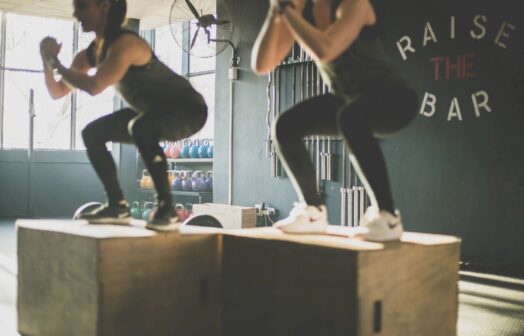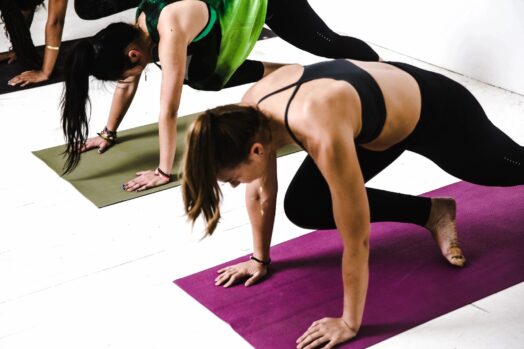As I’ve gotten older, I’ve become obsessed with being healthy and fit. Or maybe I should say, I’ve become obsessed with reading about being healthy and fit. Yeah, I’m that girl that lays in my bed drinking my morning coffee while watching other people work out on Instagram. I’ve long read about how to determine my biological age, but was never willing to spring for the price tag to get it done. So this past Christmas, my health-obsessed son gave my husband and me and subscription to Inside Tracker, a company that tests you biological age and makes recommendations to maintain or improve it. So did I need to maintain or improve? But more important, learn how to find your biological age.
I had long pledged to be my healthiest in my 50s. First it started at age 49 when I publicly declared I would be my healthiest at 50. Then it was 55, then 60, well, you get the point. But now that I’m 60, I’ve gotten into working with a trainer on strength training (and I’m obsessed!). I’ve been doing it for six months now and I can’t say that my body has changed so dramatically (I’m still on that comfort-food-and-wine-diet), but boy do I feel different. Stronger. More stable. Able to get up off the floor easier. And I can finally do real pushups. Pull-ups are my nemesis. I’ve been doing Pure Barre religiously for three years and adding in strength training has been great.

That’s kind of the outside of my me, the physical fitness part of me. The inside of me? That needs some work. My diet is amazingly healthy…for a few weeks at a time. I’ll get on a veggie kick and eat amazing salads, and then crave a burger or my beloved pasta. Dry January? I’ve conquered it once. Tried it in February and March other years. I do love my nightly glass (or two) of wine while I’m cooking dinner.
How to find your biological age
There are many platforms out there that will do a test – blood or saliva – to determine how to find your biological age. I used Inside Tracker but there are others including Elysium and Viome. So bottom line, I figured my biological age had to be pretty decent, right? Yeeeaaahhhh… We logged onto the Inside Tracker platform and signed up. After filling out a questionnaire, we quickly received an email that doctor had authorized our blood test. We had to go to a local Quest Diagnostics to get our bloodwork (or per the app, you can have someone come to your house for an extra fee). I tried to be really healthy the days before the blood test, but I guess the damage was done.
My biological age results
The results? I’m 60 years old. My biological age (or inner age as they refer to it)? A whopping 65.7!!!! I was shocked. It was really pretty interesting to dive into my cells and see what was going on. For one, I have high cholesterol. Always have, and presumably always will – it’s primarily hereditary. I don’t and won’t take statins. My doctor monitors it and I have had further testing done that shows I don’t have much cardiovascular risk right now. So my cholesterol levels added a couple of years to my inner age. Other aging biomarkers were considered “normal” but actually did play a role in my cellular age. My hormone precursors (thank you menopause), my liver enzymes (ahem, wine), and my blood sugar (carb cravings) added to that extra 5.7 years of my biological age.
Once I picked my jaw up off the floor, I dove into the Inside Tracker app more thoroughly and I will say, the level of detail they give you is pretty amazing. It explains what all of the biomarkers mean, but also gives you a really great action plan for improving your biomarkers to improve your biological age. It categorizes suggestions by diet, activity, supplements, and lifestyle. For example, my dietary suggestions were to eat more oatmeal, nuts, and olive oil. It goes further by giving you an impact score for each of the suggestions in terms of how important that individual change can be to your biomarkers. The program gave me a host of supplements I should be taking, and again, goes into great detail about how and why it will improve your biomarker. I studied it all a bit closer and it really does seem to all be rooted in science.
How to improve your biological age
I used the information to create an action plan and I set reminders and a check list to keep me on track. (Then I went on vacation and all of my progress went out the window!) But I’ll test again in a few months to see if I’ve lowered my biological age.
When I tell people about this, I’m often hit with great skepticism but I’m a believer in the science. I was unfortunately enough to have a bit of long covid and my Mayo integrative health doctor educated me on the role mitochondria play in our cellular processes and taking a supplement instantly alleviated some of those symptoms. And I’m a David Sinclair follower and believer in the science of aging. I’ve since met two people who have a lower biological age than their actual age, and they’re both health and fitness practitioners. So I do think it’s somewhat accurate.

Why your biological age is important
Knowing how to find your biological age can provide valuable insights into your overall health and well-being. Here’s why it’s important:
- Health Assessment: Biological age is a more accurate reflection of your health than chronological age. It takes into account various factors such as lifestyle, genetics, and overall physiological functioning. By knowing your biological age, you can assess how well your body is aging relative to your chronological age.
- Early Detection of Health Issues: Changes in biological age that outpace chronological age can be indicative of underlying health issues. Detecting these discrepancies early can prompt proactive measures to address health concerns before they escalate into more serious conditions.
- Motivation for Health Improvement: Understanding your biological age can serve as motivation to adopt healthier habits. If your biological age is higher than your chronological age, it can encourage you to make positive lifestyle changes such as improving your diet, increasing physical activity, managing stress, and getting adequate sleep to slow down the aging process and improve overall health.
- Personalized Health Planning: Knowing your biological age allows for more personalized health planning. It enables you to target specific areas of health that may be aging faster than others and tailor interventions accordingly. This could involve working with healthcare professionals to develop a comprehensive plan for disease prevention, nutrition, exercise, and stress management.
- Longevity Planning: Understanding your biological age can provide insights into your potential longevity. By addressing factors that contribute to accelerated aging, you may be able to increase your lifespan and improve your quality of life as you age.
- Track Progress Over Time: Regularly assessing your biological age allows you to track your progress over time. Seeing improvements in your biological age as a result of lifestyle changes can be highly rewarding and reinforce healthy behaviors.
This is not a sponsored post and I was not paid by Inside Tracker to write this. But I do believe in and subscribe to the science. Let me know if you try it!

